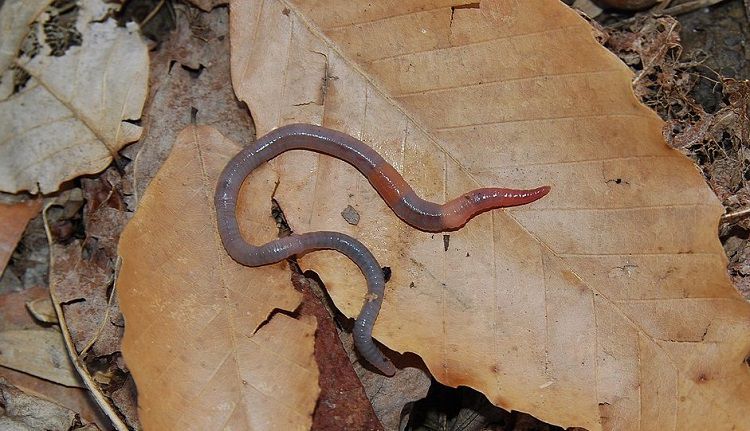Table of Contents
Worms make for interesting, low maintenance pets and are particularly great for young children who are fascinated by all things that wriggle, crawl, scamper, and slither.
While taking care of worms is relatively easy in and of itself, there could be a few things you want answers to, especially pertaining to why these creatures do certain things. Sometimes their behavior is completely natural while others it could be a sign that something is not quite right. It is important then to familiarize yourself with worms and the things they may or may not do so that you can keep them healthy.
is relatively easy in and of itself, there could be a few things you want answers to, especially pertaining to why these creatures do certain things. Sometimes their behavior is completely natural while others it could be a sign that something is not quite right. It is important then to familiarize yourself with worms and the things they may or may not do so that you can keep them healthy.
Why Are My Worms Trying to Escape?
The main reason worms try to escape is because they are not getting enough oxygen in their soil/habitat. These wriggly creatures breathe through their skin, so if the soil is too wet or if there is not enough ventilation, they will find it difficult to breathe properly and will try to make their escape from the offending area.
A drop in oxygen levels can also occur when worms are overfed. How’s that, you may ask. Well, if you are feeding them too much you will find that a lot of the food remains uneaten/undigested within the soil (at any level), which then acts as a blanket that reduces oxygen levels.
Another reason could be that, although worms do like moist soil, they do not like it saturated. If it is, then this not only affects their ability to breathe properly but it can also encourage mold and mildew proliferation. Checking to see if the soil is too wet is easy – just take a clump and squeeze it. If water drips from your hand, the soil is too wet. If this is the case, then you can rectify the issue by adding some dry bedding such as torn up newspaper pieces or peat moss.
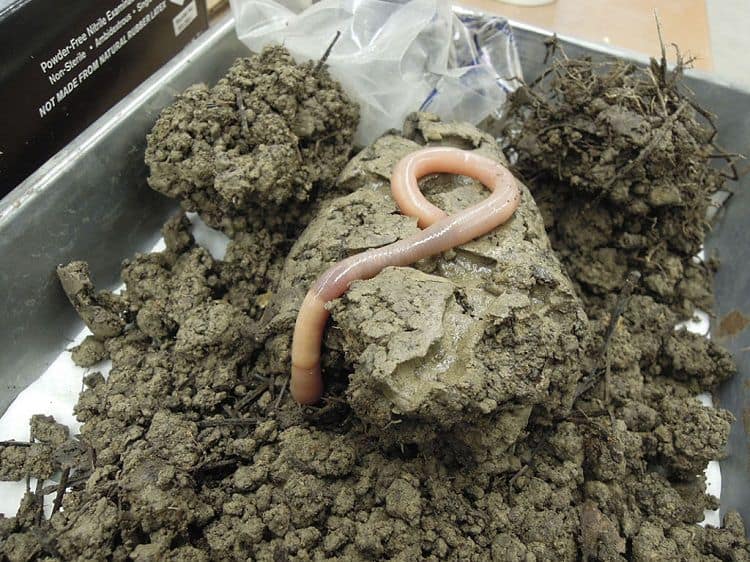
Giant Palouse Earthworm 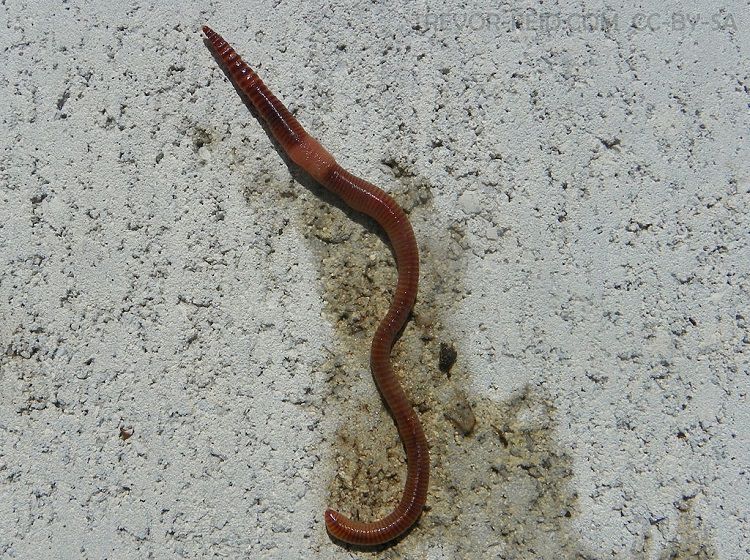
European Nightcrawler 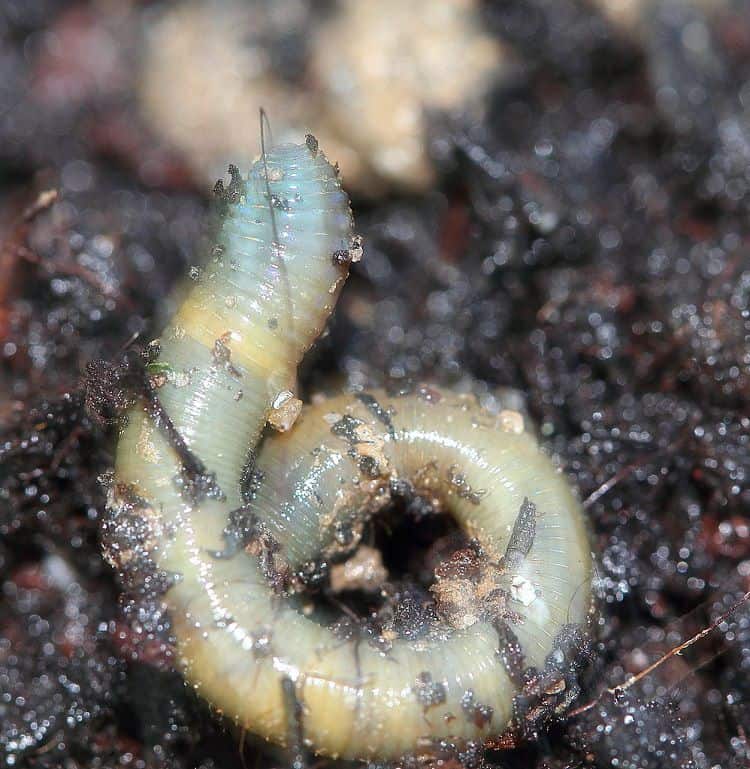
Allolobophora chlorotica HC2
Why Are My Worms Going to the Bottom?
When worms try to make their way to the bottom of their habitat, it is usually a sign that they are trying to cool down. If you have placed your worm habitat in a particularly sunny place, your worms might be getting too hot and are trying to get cool by travelling deeper into the soil.
Why Are My Worms Balling Up?
There are a few reasons for worms balling up together, but it is usually down to the condition of their bedding. It could be because:
- it is too wet or too dry
- the pH levels are off
- it is simply too crowded in there.
There may be occasions where worms ball up because they have been stressed by a nearby noise or vibration, or if they are new and have recently been shipped. If they continue to ball up after a few days, it is imperative to check the condition of the bedding.
Make sure that it is moist without being too wet and if you are worried about the pH levels, you can buy a meter to check (click here for a selection at Amazon). The best pH level for worm habitats is between 6 and 7. If the levels read higher than this, reduce them by adding calcium carbonate materials to the habitat. This could be crushed eggshells or an agricultural lime. Better airflow can also help, as can adding some fresh bedding and removing uneaten food.
for a selection at Amazon). The best pH level for worm habitats is between 6 and 7. If the levels read higher than this, reduce them by adding calcium carbonate materials to the habitat. This could be crushed eggshells or an agricultural lime. Better airflow can also help, as can adding some fresh bedding and removing uneaten food.
Why Do Worms Clump Together?
Within a worm habitat, worms clumped together is usually a sign that there is something wrong with their environment/bedding. However, in their natural habitat, worms often clump together either in the soil or out in the open.
Researchers have suggested that this behavior is the worms’ way of communicating by sliding past and feeling each other. They will use this method to protect themselves against the elements and to communicate which way they can then collectively travel to safety.
An example of this was seen in 2015 at the Texas’ Eisenhower State Park where clumps of worms were found on the center of the road going through the park. The phenomenon occurred after the area had seen record rainfall and flooding. A statement from Texas Parks and Wildlife at the time read, “When the ground is saturated, earthworms may come to the surface to migrate. They clump together for protection against the elements and as a form of group communication. The earthworms have since returned to the soil.” [source ]
]
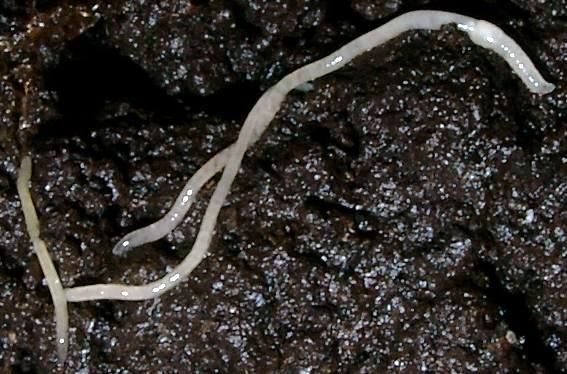
Why Are My Worms Sluggish?
Although generally easy to care for and keep healthy, there may be occasions where worms are not acting as they should . You might notice that your worms are sluggish and lethargic; this will typically be the result of unsuitable conditions within the habitat, such as soil that is either too wet or too dry.
Sometimes it may be simply the case that your worms are settling into their new home. New worms often take a bit of time to get used to their new surroundings, so be careful not to feed them too much initially.
Why Are My Worms Turning White?
Worms that turn a pale color are often being deprived of sufficient levels of oxygen; this is usually the result of bedding that is too moist. When bedding is too wet, the food you provide will begin to rot quicker, which can lead to anaerobic conditions (essentially meaning a lack of oxygen).
If you see that your worms are turning white and are looking quite skinny, it is probably the result of too much moisture in the bedding. Think of a wrung-out sponge in terms of the correct moisture levels. If your bedding is wetter than this, you should add fresh bedding such as straw or shredded paper to correct the situation. Try not to overfeed the worms as this can also be a problem. While you are correcting the moisture levels, you can remove uneaten food and refrain from adding more until the bedding has dried out some.
Photo Credits:
- Featured Image (Aporrectodea caliginosa): Smithsonian Environmental Research Center
 – This file is licensed under the Creative Commons
– This file is licensed under the Creative Commons Attribution 2.0 Generic license.
Attribution 2.0 Generic license. - Giant Palouse Earthworm
 : Chris Baugher
: Chris Baugher – This file is licensed under the Creative Commons
– This file is licensed under the Creative Commons Attribution-Share Alike 2.0 Unported
Attribution-Share Alike 2.0 Unported license.
license. - Allolobophora chlorotica HC2: Holger Casselmann
 – This file is licensed under the Creative Commons
– This file is licensed under the Creative Commons Attribution-Share Alike 3.0 Unported
Attribution-Share Alike 3.0 Unported license.
license. - European Nightcrawler: Trevor Reid – This file is licensed under the Creative Commons
 Attribution-Share Alike 4.0 International
Attribution-Share Alike 4.0 International license.
license. - Enchytraeus albidus: Paul Bachhausen – This file is licensed under the Creative Commons
 Attribution-Share Alike 3.0 Germany
Attribution-Share Alike 3.0 Germany license.
license.

